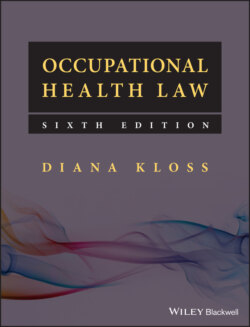Читать книгу Occupational Health Law - Diana Kloss - Страница 54
2.11 Health care workers with ablood‐borne virus
ОглавлениеIll‐informed fears about the dangers of contracting AIDS from an HIV‐infected health professional, fuelled by worldwide publicity about the Florida dentist who allegedly infected several of his patients, led to the setting‐up by the Department of Health of the Expert Advisory Group on AIDS (EAGA) in 1985 and later the UK Advisory Panel for Healthcare Workers Infected with Blood‐borne Viruses (UKAP). This has a strong occupational health representation. The panel also gives guidance about the management of health care workers (HCWs) who have hepatitis B (HBV) and hepatitis C (HCV). Guidance has now been transferred to Public Health England. Since the last edition of this book there have been important changes in the management of HCWs with blood‐borne viruses (BBVs). Comprehensive new guidance was published in 2017 and updated in 2019: Integrated guidance on health clearance of health care workers and the management of health care workers infected with bloodborne viruses (hepatitis B, hepatitis C and HIV).
The guidance states that every HCW should scrupulously adopt safe working practices to prevent the transmission of infection with blood‐borne viruses. There are particular problems where HCWs are performing an exposure prone procedure (EPP). These are procedures where there is a risk that injury to the HCW could result in the worker’s blood contaminating the patient’s open tissues (described as ‘bleed‐back’). They include procedures where the worker’s gloved hands may be in contact with sharp instruments, needle tips or sharp tissues (for example spicules of bone or teeth) inside a patient’s open body cavity, wound or confined anatomical space where the hands or fingertips may not be completely visible at all times. Where there is doubt, expert advice should be obtained from a specialist occupational physician who may in turn wish to consult UKAP. The majority of HCWs do not perform EPPs. A risk‐based categorisation of clinical procedures has been developed, including procedures where there is a negligible risk of bleed‐back (non‐EPP) and three categories of EPPs (1–3) with increasing risk of bleed‐back. The guidance also highlights exposure‐prone environments, for example road traffic collisions and industrial accidents, where glass fragments or twisted metal may lead to laceration of the skin of a HCW in the process of attending to or retrieving a wounded casualty. Activities of emergency personnel in such environments are divided into four categories, A to D, according to the likelihood of the occurrence of bleed‐back.
All HCWs, including those who are self‐employed or employed in the independent sector, are under ethical and legal duties to patients. These are reflected in guidance from the regulators, including the GMC, the NMC and the Health and Care Professionals Council. Those who believe that they may have been exposed to infection with a serious communicable disease in their personal life, or in the course of their work, must seek appropriate expert professional advice. Those HCWs who are aware that they are infected with one or a combination of HIV, HBV or HCV must ensure that they are assessed regularly by their treating physician and promptly seek and follow expert OH advice. A failure of a professional who knows or suspects that he is infected with a blood‐borne virus to seek medical advice and act on it is regarded as serious professional misconduct by the medical, nursing and dental professions. The GMC in 1997 removed from the medical register the name of Dr Patrick Ngosa for serious professional misconduct. He was a gynaecologist who feared that he had acquired HIV from a woman with whom he had an affair, but refused to have a test and continued to work for some time until eventually agreeing to a test which proved positive. Dr Gaud, a London surgeon who, realising that he was hepatitis B e‐antigen positive, substituted another person’s blood for his own for the purposes of a blood test. He continued to operate, infecting several patients. He was convicted of a crime, imprisoned and struck off the medical register (R v. Gaud (1995)).
Employers should promote a climate that encourages confidential disclosure. Those who perform, or who may perform, EPPs must obtain further expert advice about modification or limitation of their working practices to avoid EPPs until they meet the appropriate criteria to recommence EPPs. Procedures which are thought to be exposure prone must not be performed while expert advice is sought.
